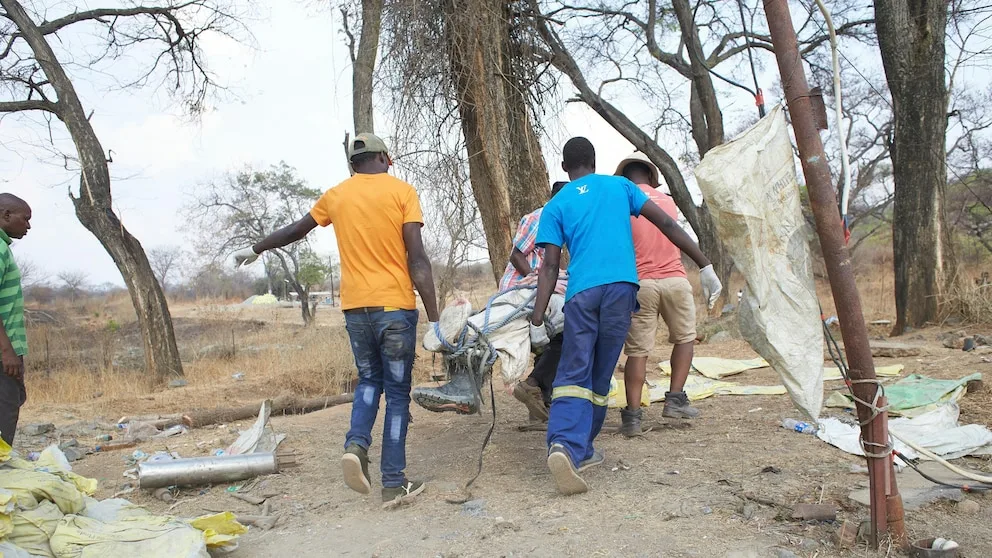REUTERS
Norah Nasimiyu knows the future of Kenya’s garment trade, which has employed her for 13 years and helped her put six children through school and university, lies in the hands of the U.S. Congress.
And like others, she is worried.
U.S. officials visiting South Africa this week to meet African trade ministers will face calls to reauthorise the African Growth and Opportunity Act (AGOA) which expires in 2025.
Despite longstanding bipartisan support from lawmakers, who view Washington’s flagship African trade initiative as critical to taking on China, deep dysfunction on Capitol Hill and divisions over the need for updates have raised doubts.
Apparel companies and industry insiders warn that Africa risks a once-in-a-generation shift away from Chinese manufacturing passing it by, with an estimated 240,000 to 290,000 jobs such as Nasimiyu’s under threat.
“We are praying that they extend,” the single mother said during a break from stitching Levi’s jeans at a Nairobi factory. “It is very hard to get a job here in Kenya.”
Apparel has been the standout success story of AGOA, which launched in 2000 to help develop African economies and foster democracy.
African apparel exports under the programme reached nearly $1.4 billion last year, double the amount pre-AGOA.
Pankaj Bedi, chairman of UAL and Norah Nasimiyu’s employer, said AGOA’s duty free access to the world’s biggest consumer market is the reason his company – Kenya’s largest garment producer – exists.
“Almost 100% of what we are exporting goes to the U.S.”
BYPASSING AFRICA
Industry insiders and policymakers see a chance to build on that success as companies reduce their dependence on China in the wake of the pandemic and subsequent supply chain headaches.
“We’ve been struck by how open the opportunity is now for us,” South African Trade Minister Ebrahim Patel said last week.
Nearly 80% of companies polled in a July survey by the United States Fashion Industry Association (USFIA) planned to reduce Chinese sourcing over the next two years.
“Many of them talk about Africa,” said Stephen Lamar, CEO of the American Apparel and Footwear Association.
Capturing even a fraction of that business could prove transformative for Africa. But companies need clarity, he said, adding: “If it is not renewed until two years from now, these current investment decisions are going to bypass Africa”.
That lack of clarity is not only hitting new investments.
The USFIA survey found that 45% of respondents had already reduced sourcing from AGOA countries over renewal uncertainty, while another 45% plan to cut sourcing from the continent if there is no reauthorisation by June 2024.
‘COLLAPSE’
African governments are pushing for a similar reauthorisation to the 10-year AGOA extension approved by Congress in 2015 with bipartisan support, ideally before an expected U.S. election year pause on new trade legislation.
But that is looking increasingly unlikely.
“There’s a high level of uncertainty about what happens and the context keeps shifting,” said Michael Walsh, a senior fellow at the Philadelphia-based Foreign Policy Research Institute.
Amid deepening global polarisation, Moscow, Beijing and the West are all leveraging trade and economic ties as they step up efforts to court African governments.
More than a dozen U.S. senators are pushing for a quick AGOA renewal arguing the need to “counter the malign influence of China, Russia, and other foreign actors”.
But the House of Representatives, paralysed for weeks by factional fighting over its speakership, faces a daunting list of must-pass legislation.
And there is another obstacle to a quick reauthorisation, namely a well-intentioned desire to improve AGOA.
The U.S. International Trade Commission (USITC) in a report earlier this year highlighted major shortcomings.
More than 80% of duty-free non-petroleum AGOA exports, for example, came from South Africa, Kenya, Lesotho, Madagascar and Ethiopia.
“Some countries have benefited greatly from AGOA, but the majority have not,” Constance Hamilton, the Biden administration’s top trade official for Africa, said last week, calling for Congress to consider changes that would “make the programme more impactful”.
Such talk worries apparel company executives, who point to the troubled fate of the Generalized System of Preferences (GSP) – the largest and oldest U.S. trade preference programme.
Congress failed to renew GSP before it expired at the end of 2020 and its reauthorisation remains bogged down in gridlock between the House and Senate over eligibility requirement changes.
Attempts to change AGOA risk creating a similar impasse, said Greg Poole, Senior Advisor for Global Sourcing at clothing company The Children’s Place (PLCE.O).
“If we try to radically change AGOA, it’s going to get stalled out. And if it gets stalled out, it’s going to follow the path of GSP,” he said.
There is little doubt what would happen in AGOA’s absence.
The USITC report said AGOA benefits “appear to be essential for … countries to maintain their apparel exports to the United States”.
It pointed to a temporary suspension of Madagascar’s AGOA benefits in 2009, which cost it 50,000 to 100,000 jobs, while Ethiopia lost 100,000 jobs when it was suspended last year.
In Kenya, UAL Chairman Bedi remains hopeful, but knows how things will play out if AGOA evaporates.
“All the companies which are here will be gone for sure, including mine … The industry will collapse.”



Connect with us on our socials: